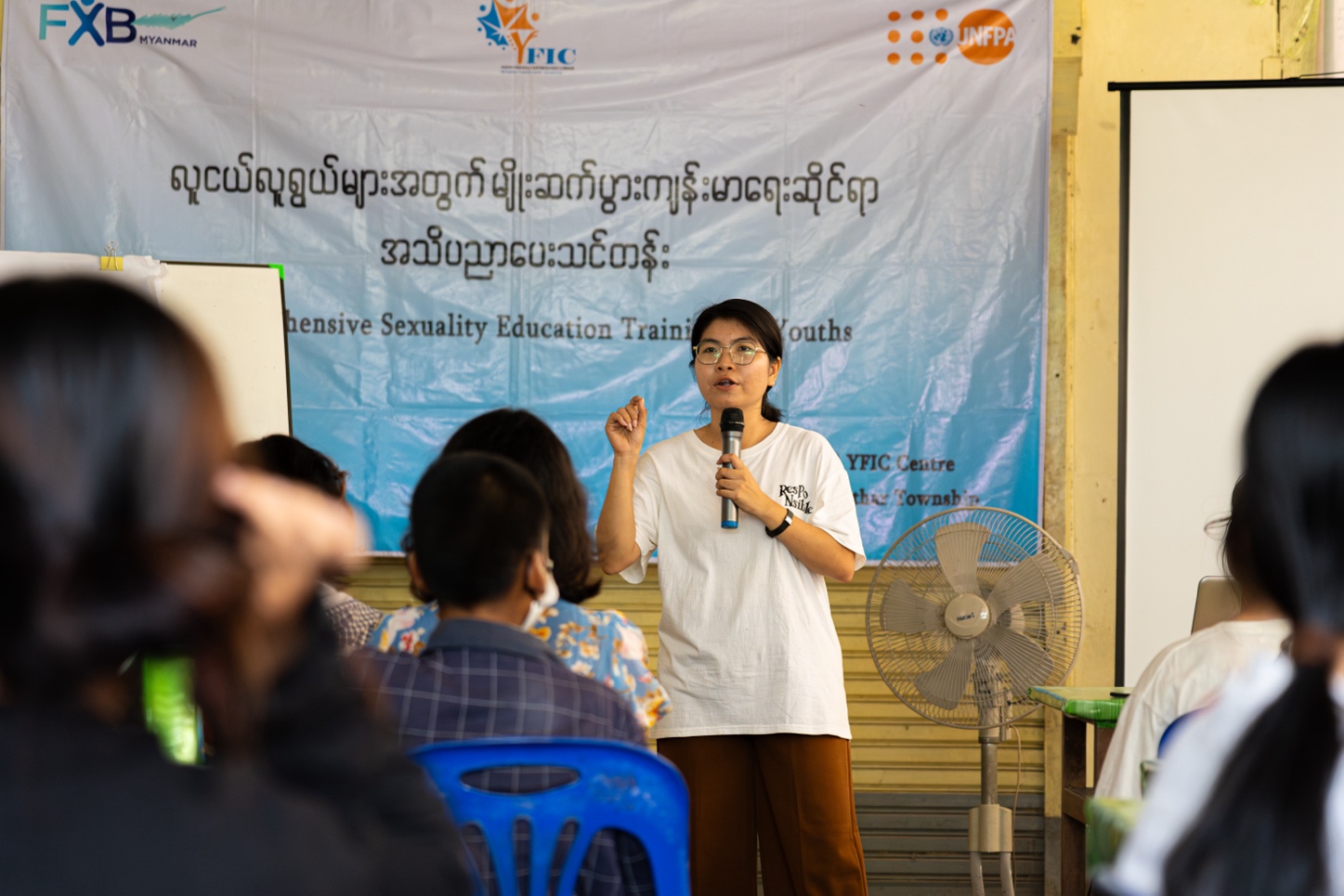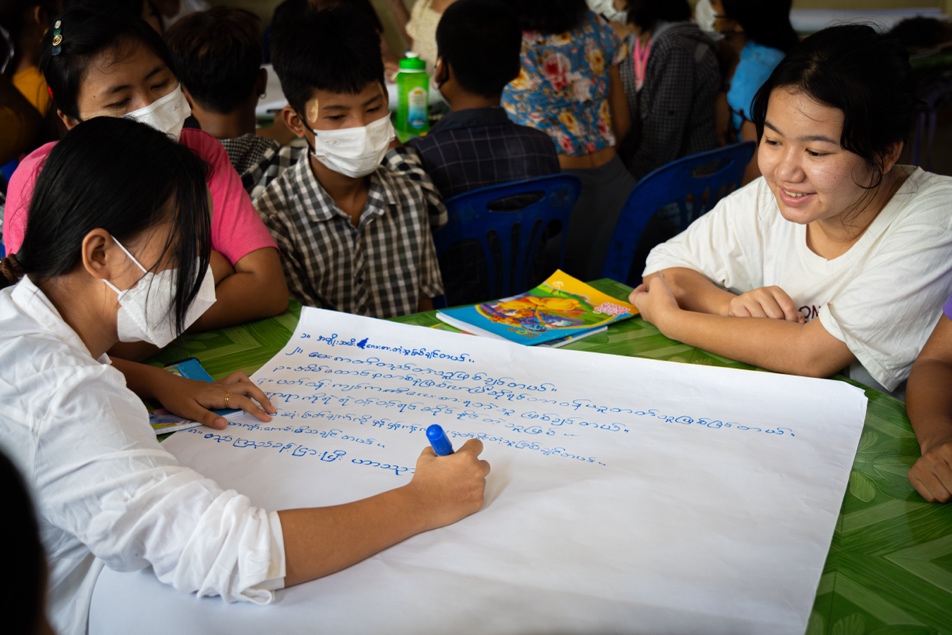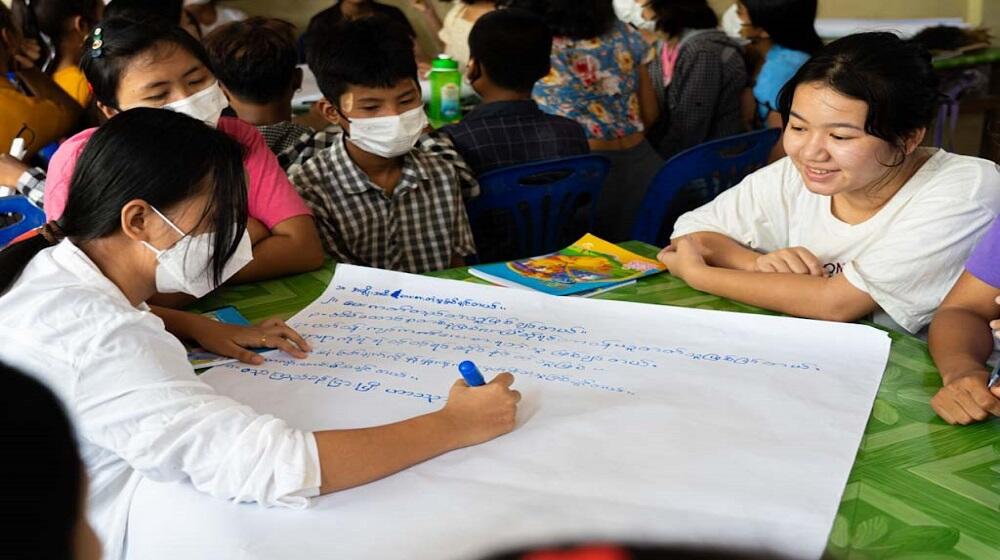
Young people participate CSE training organized by AFXB in Shwe Pyi Thar township, Yangon. Photo: UNFPA Myanmar
"As a youth living amidst ongoing conflicts, is like walking through a maze blindfolded. The crisis disrupts not just our lives but also our access to essential information, particularly about our health and rights. Even in our homes, there's a veil of stigma and silence on topics like sexual and reproductive health. We're navigating through life without the necessary guidance, facing barriers at every turn,” said May Oo, 15, a young woman from Shan State.
"Comprehensive Sexuality Education (CSE) for young people, encompassing both sexual and reproductive health as well as an understanding of gender and gender-based violence, is crucial in preventing unwanted pregnancy, unsafe abortion, and sexually transmitted infections (STIs). CSE not only educates about sexual and reproductive health but also addresses the complex issues of gender dynamics and violence, thus reducing adolescent fertility rates. This comprehensive approach is essential, as high adolescent fertility exposes young women to serious health risks and can disrupt their future prospects."
In Myanmar, according to 2019 Inter-censal survey, the adolescent fertility rate, a critical indicator of sexual and reproductive health among young people, was recorded as 20.3 births per one thousand women aged 15-19 years. This rate reflects a significant variation across different areas and age groups. In urban regions, the rate stood at 17 births per thousand, while in rural areas, it was higher at 22 per thousand. These figures highlight the varying levels of access to sexual and reproductive health information and services among adolescents in different parts of Myanmar.
Access to sexual and reproductive health information is a fundamental human right for all including young people. With many youths marginalized and vulnerable, particularly in the current humanitarian setting, the need for a comprehensive and inclusive, CSE program becomes essential for the communities.
Amidst the backdrop of ongoing political challenges, UNFPA, the UN sexual and reproductive health agency, and Youth Sexual and Reproductive Health partners come together to harmonize Comprehensive Sexuality Education (CSE) out of school curriculum- a crucial step towards empowering young people in these challenging times.

|
Young participants actively engage in group exercise at CSE training organized by AFXB. Photo: UNFPA Myanmar |
The process towards CSE harmonization is marked by a collaborative and inclusive approach. Key stakeholders, including NGOs, local organizations for persons with disabilities, youth-led organizations, and LGBTQIA+ groups, have come together to improve CSE manual for facilitators that is culturally sensitive and contextually relevant. The process involves reviewing existing content, consultations with different stakeholders including OPDs, LGBTQIA+ and local youths, harmonizing curricula, pilot testing, and finalization, ensuring that the curriculum is more inclusive and reflective of the latest research and societal needs specifically for Myanmar context.
Ramanathan Balakrishnan, UNFPA Representative for Myanmar said, "Despite the complexity of the conflict situation and its associated operational challenges, UNFPA commitment to the young people of Myanmar remains unwavering. We must move forward because the youth of Myanmar deserve a future where they are equipped with the knowledge and skills to reach their full potential. The harmonization of the CSE curriculum is more than an initiative; it's a crucial step towards empowering youth to make informed decisions about their lives.” He continued, "In these challenging times, providing accessible and comprehensive sexuality education is a priority for us."
In the harmonization process of Comprehensive Sexuality Education (CSE) curriculum, it's crucial to emphasize the importance of inclusiveness. We must consider particular needs of people with disabilities, LGBTQIA+ community and other marginalized and vulnerable young people. This approach not only upholds principles of equality and human rights but also ensures that every young person is accounted for.
Khin Mya Kyi, a young woman with physical disabilities said, “I faced numerous barriers when it came to understanding my body and rights as a person with a disability. People often think that I didn't need this knowledge. After I joined CSE training, I came to understand that everyone has the right to access information regardless of whoever they are. I feel empowered.” CSE is not just about knowledge; it's about empowerment. It has given youth the opportunity to break free from those old barriers and embrace a more inclusive and informed life.
“Thanks to CSE training, my daughter's knowledge and confidence have transformed her into a responsible and informed young adult. She shares what she's learned with her siblings, creating a positive environment at home,” Roi San, a parent of one of the CSE trainees said.
The positive impact of CSE training doesn't stop there. It has significantly empowered young people but has also brought the community closer together."
Thae Thae Mar, CSE trainer and a woman with disabilities said, "CSE training is meticulously tailored to the unique needs of young people. Our approach is holistic, covering crucial topics like sexual and reproductive health, gender stereotypes, and communication skills. We ensure that each session is interactive and engaging, allowing for a deep understanding and practical application of the knowledge.”
She continued, “Additionally, we prioritize disability inclusion, ensuring that our training is accessible and beneficial to all participants. This approach not only enhances learning but also fosters an inclusive and supportive community among our participants."
Chaw Yadanar Lin, CSE trainee, said, 'Through CSE, we are not just learning; we are evolving. Equipped with knowledge and confidence, we are stepping forward to claim our rights and shape our futures.'
This collaborative initiative of UNFPA and its partner youth organizations echoes the core of the International Conference on Population and Development (ICPD)'s commitment to empowering youth. It's a testament to how Comprehensive Sexuality Education is not just changing young people but also reshaping communities, paving the way for a future where every young person is informed, empowered, and ready to make a positive impact in the country."
Global Affairs Canada, through its funding support to UNFPA, contributes to the development of young people in Myanmar via Health, Empowerment, and Right (HER) programme, which includes the Comprehensive Sexuality Education (CSE) for out-of-school training. This vital support plays a key role in empowering and educating the youth, equipping them with crucial knowledge, attitudes, and skills in sexual and reproductive health, as well as in understanding gender and addressing gender-based violence.


